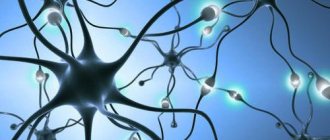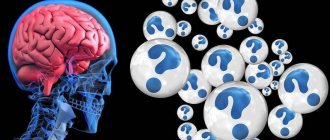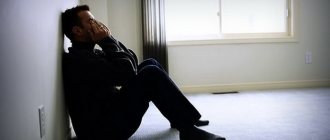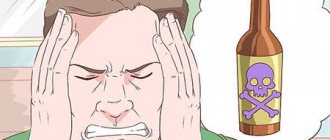In this article we will talk about what depression after alcohol is, how it manifests itself and how to deal with it correctly.
When a person drinks frequently, over time he begins to experience the phenomenon of depression. This is not such an ordinary depression, but alcoholic depression. That is, there is no particular reason for it, the reason for this is simply the cessation of drinking alcohol. The condition itself depends on the amount of alcohol taken and its strength. Moreover, a lot depends on the human psyche and the characteristics of his body. All this can create discomfort during a hangover and many people prefer to continue drinking because of this.
What is depression after alcohol?
Depression after alcohol
Depression after alcohol is not always directly related to a hangover. It can also occur for other reasons.
So, depression is divided into two types:
- Hangovers . They occur when a person drinks a lot of alcohol the day before. In other words, it's a hangover. Against this background, depression appears, but it does not last for a long time. As soon as all the alcohol leaves the body, the condition immediately returns to normal.
- When giving up alcohol . This applies to people with alcohol addiction. More than half of people suffering from alcoholism are depressed after finishing their binge. For them, alcohol becomes a way to escape from problems; with it they don’t worry about anything and relax. Some people simply don’t know how to deal with bad emotions any other way. Moreover, the development of depression is also influenced by intoxication of the body after alcohol.
At the same time, our hormones in the body can also influence a person’s condition. The fact is that they not only help the body, but also make you experience certain emotions.
In the human brain there is a so-called blood-brain barrier. It does not allow harmful substances to penetrate through it. It turns out that human organs and systems begin to suffer, but the brain seems to remain intact. However, some drugs pass through it, and ethanol is one of them. And alcoholic drinks are made on its basis.
Once in the brain, ethanol provokes the production of serotonin. This hormone is responsible for happiness, pleasure and relaxation. However, it is fraught with danger because it can develop dependence on alcohol. This happens when it is consumed in large quantities.
This reaction occurs because dopamine is activated along with serotonin. When alcohol leaves the body, that is, it is cleared, the same thing happens with serotonin. It does not end completely, but its level drops significantly. Accordingly, the mood becomes worse. Because of this, the person thinks about drinking more.
Among other things, alcohol increases the production of norepinephrine. So, as the effects of alcohol decrease, a person becomes apathetic and lethargic.
It is important to understand that alcohol will not help you get rid of depression. The situation will get even worse. At the same time, depression is an excellent prerequisite for the development of addictions, including alcohol. In order to ultimately overcome all these conditions, you will have to recover not only from mental disorders, but also from alcoholism.
Chemical reactions in the human body under the influence of ethanol
Alcohol breakdown products (acetaldehydes) form a deficiency of the hormone serotonin, which is responsible for a person’s elevated mood.
Scientists have long proven that a person’s emotional state directly depends on biologically active chemicals that are directly responsible for the transmission of nerve impulses. Such substances are called neurotransmitters. Their work can and is fundamentally disrupted by ethanol when it enters the body. Alcohol breakdown products (acetaldehydes) form a deficiency of the hormone serotonin, which is responsible for a person’s elevated mood. In addition, it is under the influence of alcohol that the amount of norepinephrine in the body increases, the so-called “aggression” hormone. And as soon as the growth of this substance decreases, a person additionally feels a decline in mood, depression, apathy, which leads to a depressive state. The situation is aggravated by the fact that acetaldehydes (ethanol breakdown products) affect the brain. This leads to insufficient nutrition of the neurons of the central nervous system. As a result, brain cells gradually die.
Important: it is worth noting that the alcohol itself is neutralized and eliminated from the body faster than the residual chemical reactions in the body of the drinker cease. Hence the constant state of depression after drinking alcohol or during alcoholism.
Scientists have proven that alcohol in any form is a powerful provocateur of any pathological and mental conditions. A direct direct connection between alcoholism and the formation of such conditions as:
- Manic psychosis;
- Schizophrenia;
- State of anxiety and paranoia;
- Depression;
- Suicidal tendencies, etc. In this case, breaking out of alcoholic depression on your own is very difficult.
Important: alcoholic depression and other mental disorders most often overtake patients over 35 years of age. This is due to the long-term and negative effects of ethanol and its breakdown products on the central nervous system.
Why depression occurs after alcohol: reasons
Causes of alcoholic depression
As a rule, depression after alcohol does not develop just like that. There are reasons for this. Let's find out which ones.
- Psychological dependence . When a person drinks alcohol for a long time, he already gets used to using it to lift his mood. He is no longer able to distance himself from reality in any other way, and when there is no alcohol, he gets upset. If the addiction is strong, then when a person gets rid of it, he may acquire another one, for example, start gambling.
- Alcohol withdrawal syndrome. This is called “alcohol withdrawal”. If you start treating this condition in time, it goes away very quickly. However, anxiety and depression may remain for a long time.
- Alcohol intoxication . When a person drinks alcohol for a long time and in large quantities, the functioning of the brain is disrupted. In particular, some of its zones work poorly, and the receptors become less sensitive. This can provoke alcoholic encephalopathy, when a person’s level of intelligence decreases, memory, attention deteriorate, and so on. Gradually these disorders become less pronounced, but they often persist throughout life.
By the way, very often people suffering from alcoholism start drinking precisely because of the development of primary depression. That is, they may not be addicted at first, but eventually depression pushes them to drink more alcohol. As a result, this leads to regular binge drinking. So if the first signs of depression appear, it is important to start treatment immediately so that later it is not too late.
Types and forms of alcoholic depression
Alcohol depression is conventionally divided into three forms, which depend entirely on the amount of alcohol a person drinks
Alcohol depression is conventionally divided into three forms, which depend entirely on the amount of alcohol a person drinks. So, there are these types of depression:
Treatment of alcoholic epilepsy: symptoms and medications
- A short-term depressed state of mind due to drinking too much the day before (holiday/event/occasion). This form of depression is manifested by depression, apathy, and a feeling of guilt for what was done the day before. Also, the condition against the background of depression is a decrease in blood glucose levels, which leads to a feeling of fatigue and increased sadness. The condition may be accompanied by chills and tearfulness. As a rule, this condition goes away on its own within 1-2 days and does not require special treatment.
Important: the tendency to such conditions is genetic and is caused by insufficient production of alcohol dehydrogenase, the enzyme responsible for processing and neutralizing ethanol.
- Severe form of binge depression. It usually appears after the cessation of binge drinking and causes a complex mental state of the patient. This form of mental disorder usually occurs 2-4 days after the cessation of binge drinking. The condition requires constant monitoring by specialists, since under the influence of psychological factors the patient may relapse again. Basically, this type of depression manifests itself in alcoholics at stages 2-3 of addiction. Signs of such depression are anxiety, nervousness, the absence of any positive emotions and the inability to experience them, a feeling of uselessness and general purposelessness of life.
- Prolonged post-alcohol depression against the background of a past history of constant drinking. This type of depression is the most uncontrollable. Outwardly, a person who has been drinking alcohol for a long time and finally gives it up may be no different from other people. However, internally the individual will experience psychological collapse. Finding himself face to face with everyday life and unable to relax in the usual way and experience a feeling of euphoria, such a patient may rush to other extremes. Alternatively, drugs, gambling, extreme sports or recreation, promiscuity. Such a lifestyle can ultimately cause active psychosis, and an already caused illness can lead a person to a sad ending.
Depression after alcohol: symptoms
Symptoms of depression after alcohol
When a person becomes depressed after drinking alcohol, he or she will exhibit certain symptoms. They concern both internal and external states.
So, depression is manifested by the following signs:
- Decrease in social activity . The person does not want to communicate with anyone, tries to avoid people so as not to have contact with them again. That is, the person seems to withdraw into himself
- Frequent mood swings. It seems that the person was cheerful a minute ago, but now he behaves as if he had a tragedy in his life
- Inhibition of mental reactions . That is, a person reacts slowly to something fast, and accordingly he also moves, as if in no hurry
- Decreased cognitive abilities
- Sleep problems. Often people experience insomnia during depression. It seems that a person wants to sleep, but he cannot
- Disturbances in the gastrointestinal tract, liver, pancreas . As a rule, after a long binge, these organs already suffer, but a depressed state also does not bring them anything good
- Feeling of worthlessness. A person begins to think that he is hopeless and incapable of anything.
- Suicidal mood. It also happens that a person wants to die, he even begins to think about how this could be done
- Severe anxiety . Often there is a feeling of anxiety, although everything seems to be calm and nothing that could alarm is happening
- The desire to hide from reality . Again, in this case the person may start drinking again
- Feeling hopeless and hopeless
- Isolation from everyone. The person does this consciously. He just locks himself at home and doesn't talk to anyone.
- Loss of interest in the world around you
- Decreased libido. Yes, during depression a person has no sexual desire. This is due to a depressed state
- Inability to do usual things
- Unreasonable aggression and irritability
What is the danger of depression after alcohol: consequences
Consequences of depression after alcohol
The main danger that depression after alcohol has is the period when a person himself wants to get rid of binge drinking. Someone begins to undergo treatment themselves and uses psychotropic drugs, for example, tranquilizers or sedatives. As a result, the condition may worsen and this will lead to alcohol abuse.
In addition, the consequences of self-treatment may be the following:
- Insomnia
- Memory impairment
- Slowing down of brain processes and, as a result, a decrease in intelligence and deterioration in reaction
- Severe irritability and restlessness
- Lethargy
If you notice that your loved one is developing an alcohol addiction, it is recommended that you immediately consult a psychotherapist. Otherwise, the consequences may be disastrous.
How to relieve depression after alcohol: treatment
Depression after alcohol is treated in several stages. As a rule, therapy consists of taking special medications, as well as psycho- and physiotherapy.
Conservative treatment
This method is used when a person is worried about withdrawal symptoms. It involves taking various medications:
- Antidepressants . These are psychotropic substances that stabilize the production of serotonin and norepinephrine. The drugs force the body to produce them. Accordingly, the person’s condition improves and negative emotions do not appear. Treatment is carried out using various drugs, among them Mianserin, Pyrazidol and Mitrazoline.
- Tranquilizers . These drugs have a relaxing and hypnotic effect. Some may even provide extra energy. Phenazepam, Diazepam and Sibazon are often used
All medications are selected individually for all patients. However, they are sold from pharmacies only by prescription.
Psychotherapy
When a person stops drinking and develops depression, he is treated with the help of psychotherapy. The point of the method is for people to communicate. Classes can be either individual or group. On them, people with addiction talk about their difficulties in life and gradually free themselves from them. At the same time, conversations help cope with nervous tension and other manifestations of depression.
Physiotherapy
Treatment using this method allows you to restore the nerves. It consists in applying the following procedures:
- Thermal or warming , for example, therapeutic mud, hot water, and so on. In other words, this is anything that can increase body temperature. Heat allows you to warm and relax muscles, as well as dilate blood vessels. This is very beneficial for the body. Moreover, as body temperature increases, a person sweats. Accordingly, harmful substances are removed from the body.
- Electrical stimulation . Allows you to restore the natural functions of the body, which could be weakened for various reasons. This is done using current.
- Artificial sleep . This sleep allows you to make up for the lack of natural sleep, eliminate nervous tension and bring your blood pressure back to normal. This is the best method of restoring the body after any illness.
As a rule, complex therapy is prescribed, that is, different methods are used together, and not just one.
Methods and methods of combating pathology
Some patients do not understand that symptoms and treatment for alcohol-related depression are interrelated. They do not consider depression a consequence of taking excessive doses of alcohol; they think that with the help of alcoholic drinks they treat their bad mood and get away from problems.
For treatment to be successful, you need to admit to yourself that you need help. The patient must understand his illness and be firmly convinced of his desire to be cured.
Medication
Medication or pharmacological methods of combating depression cleanse the body of toxins accumulated in it over a long period of drinking alcoholic beverages. In addition, the patient is prescribed powerful antidepressants, as well as, depending on his condition, sedatives.
We suggest you read: The face and body turns red from alcohol: reasons, reviews, what to do to prevent your face from turning red?
The medications prescribed by the doctor must improve the metabolism, as well as vitamins A, B, PP, C, which are necessary for the normal functioning of organs.
During this period, it is imperative to pay special attention to the functioning of the heart and the condition of the blood vessels.
In addition, medications are offered that should reduce cravings for alcohol, and they are selected strictly individually:
- Reopoliklyukin – is able to restore the water-alkaline balance, restore metabolism;
- Essentiale – must restore liver function to work in detoxifying the body;
- Nootropic drugs.
Essentiale - a drug for the treatment of depression after alcohol
If the patient is already in a state of delirium tremens, he has auditory and visual hallucinations, then he must be immediately sent to a psychiatric hospital, since only specialists can deal with such a condition.
Visiting a psychotherapist is an extremely important method of treating alcohol-related depression. Working with a psychoanalyst, the patient finds new goals in life, learns to look positively at life, communicate with people again without drinking strong drinks, in order to re-enter society and feel like a full-fledged member of it.
Working with a qualified specialist, the patient begins to understand that his drunkenness is a road to nowhere. A person must feel the joy of life and learn to fight with himself.
In addition to drug treatment and psychotherapeutic methods, the patient is prescribed physiotherapeutic procedures. They will be an excellent addition to drug treatment. Usually, artificial sleep, acupuncture, electrophoresis, electrical stimulation and other procedures are prescribed for depression.
These procedures are completely safe and also have an excellent healing effect. They are able to reveal the internal resources of the body, restore the immune system, and stimulate the biochemical processes occurring in the body. Systems destroyed by long-term alcohol consumption are restored naturally.
Prevention of depression after alcohol: methods
Prevention of depression after alcohol
First of all, the person himself must realize that he is depressed after alcohol and needs help. Of course, ideally, if a person himself turns to a psychologist.
At the same time, in addition to the basic treatment, it is important to follow some rules:
- It is important to avoid noisy companies where alcohol is consumed
- Learn to relax without drinking alcohol
- Learn to control the amount of alcohol you drink
- Find a hobby that suits your interests
- It is important to receive help and support from loved ones during treatment; it greatly helps to quit drinking alcohol.
- Start playing sports. Pay attention to your health
Learn to enjoy life. To do this, you need to come up with hobbies and entertainment without alcohol. For example, the same sports activities, outdoor recreation, and so on.
Experts consider alcoholic depression to be the most dangerous mental illness. It can not only lead to mental disorders, but also to suicide. However, in the modern world the disease is successfully treated. The main thing is that the person himself admits that he needs help, and also finds the strength to reach the end.
Consequences and dangers
The most dangerous consequences of alcoholic depression include:
- suicidal thoughts;
- suicide attempts;
- personality degradation;
- aggressive behavior that threatens others;
- development of epileptic psychosis;
- development of a chronic form of alcoholism;
- formation of alcoholic encephalopathy;
- the emergence of various psychopathologies.
Alcoholic depression is a severe mental disorder, so such patients require constant monitoring by medical personnel. They are encouraged to spend more time outdoors. Sun rays promote the formation of tryptophan, which is involved in the synthesis of serotonin, the hormone of happiness. Walks in pleasant, non-drinking companies, teas with a sedative effect and regular rewards in the form of gifts and delicious food will help a person come to his senses.
Depression after alcohol: forum, reviews
When someone close to you develops alcoholic depression, people often turn to forums for advice, or maybe just read reviews from those who have already gotten rid of this disease. In any case, you must understand that the most effective treatment for depression is only possible when you turn to professionals. Otherwise, the situation may get worse.
Review 1
Review 2
Review 3












